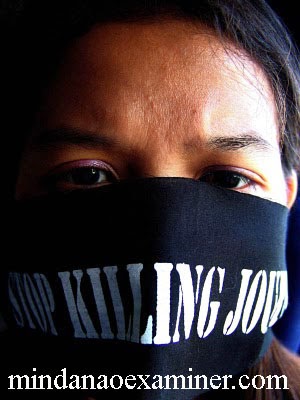
ZAMBOANGA CITY (Mindanao Examiner / May 5, 2014) – Motorcycle gunmen killed a Filipino broadcaster in an attack in Tawi-Tawi province in southern Philippines, police said.
It said the attackers, who were on a motorcycle, shot the 35-year old Richard Najid several times in the village of Tubig Boh in the capital town of Bongao late Sunday. Najid was also on a motorbike heading home from a basketball game when he was ambushed.
Najid, who was also the station manager of radio station dxNN, was rushed to the hospital by policemen – who responded to the gunshots – but the victim died along the way.
The motive of the killing is still unknown, but police said it has launched an investigation into the murder.
The National Union of Journalists of the Philippines and the National Press Club of the Philippines have condemned the killing.
The NUJP said it was disturbed by the reaction of the provincial police chief Joselito Salido who reportedly dismissed quickly the possibility of Najid’s murder was related to his work. Salido was also quoted by the NUJP as saying that the victim was “just one disc jockey, a person that plays popular music on FM radio station. He is not a journalist.”
“That the chief of a province’s police force can display not only insensitivity but, more alarming, ignorance reflects on the quality of what is supposed to be the country’s main law enforcement agency and explains why media murders and human rights violations in general continue to be committed with impunity,” it said.
In June 2007, gunmen also killed radio broadcaster Vicente Sumalpong in Bongao town. His two companions who were also journalists were wounded in the ambush. The three were on a motorcycle when gunmen attacked them.
The latest attack came a day after Philippine media joined the celebration of the World Press Freedom Day, vowing to protect each other from attacks and threats and upholding the rights of every journalist in the country.
“For us journalists in the Philippines, where a critic can anytime fall down with a bullet in the head, it is the day to review what press freedom is all about, celebrate the times when the Philippine press has helped to expose corruption or enlighten the public on a difficult issue and, last but never the least, remember our colleagues who were slain by press freedom’s enemies,” the National Union of Journalists of the Philippines said during the celebration.
Ten journalists have been murdered in the past 12 months in the Philippines and 26 since President Benigno Aquino assumed the presidency in 2010, making the country one of the most dangerous for journalists in the world, according to the International Federation of Journalists.
Joel Egco, president of the National Press Club of the Philippines, said the killing of Najid is “is a humiliating sequel to President Benigno Aquino’s pathetic gaffe when he attempted to address the issue of media killings before local and international media recently.”
He said Najid’s murder came barely a week after Aquino blabbered helplessly when asked to explain why media killings persist under his administration.
“This is a clear indication of lack of real concern or plain disregard for the deadly plight of Filipino journalists. He couldn’t even get his facts straight. The Aquino government’s apparent apathy toward the unabated killing of journalists is a contributory factor to the culture of impunity that threatens press freedom,” he said.
Egco said the acts of intimidation against journalists in the country are an affront to press freedom.
“Journalist killers grow more brazen each day and as the list of the fallen swells, so must our resolve to put an end to these killings. Since he became president, we have yet to hear from President Aquino any strong directive to law enforcers and justice personnel to work doubly hard in addressing the issue.”
“Each death becomes part of government statistics, a main ingredient in the administration’s lip service.
As we mourn the passing of another brother in the profession, we warn Mr. Aquino that in the end, he will only have himself to blame for allowing media killings become a flourishing trade under his watch,” Egco said.
In 2009, gunmen who were followers of a political clan in Maguindanao province in southern Philippines killed 58 people – at least three dozen of them journalists and media workers – in one of the worst attacks against the media in the country. The case has not been resolves up to now, although most of those involved in the brutal murders have been arrested. (With a report from Ely Dumaboc)
